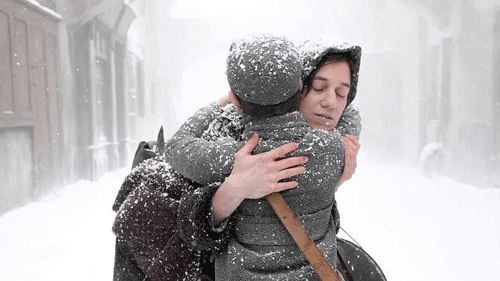Author: Zhang Zijiong
The French film "The Promise of Childhood" is adapted from Roman Gary's autobiographical novel "I Promise", which tells the touching and deep affection between the protagonist and his mother Nina. Roman has not only won several literary awards, but is also a gold medal pilot, and he has a story of love and shackles in his heart. He used his brilliant life to fulfill the promises he made to his mother in his childhood, waiting for the crown to be added to his body and return in a magnificent costume, but he missed the embrace of the world. In the film, there are many scenes in which Nina and her son are forced to move. When I revisited "The Promise of Childhood" years later, I happened to be moving. Under this opportunity, quietly listening to their stories, I can't help but feel a lot of emotions.

Family affection is the eternal theme of ancient and modern Chinese and foreign literary and artistic creation. Chinese culture has a long history and is broad and profound. As the saying goes, filial piety comes first. Filial piety, an important part of Chinese culture, is the blood of Chinese, and has lasted for thousands of years. Affected by this, Chinese are particularly obedient to the love of their parents. It is worth noting, however, that this phenomenon seems to be undergoing some subtle changes at the moment. Many young people's control of their parents in the name of love is no longer fully accepted, and even full of resistance. This often has a lot to do with the way love is expressed.
The mother, Nina, in The Promise of Childhood, is extremely stubborn, harsh and authoritarian. She hopes that her son will become a writer, diplomat, general, ambassador, etc. in the future, and has developed a strict study plan for him, including music, dance, shooting, etiquette and so on. "Men can only fight for three things, women, honor, and country." She taught her son like this, bent on raising him to be a great man.
Some say that this is a harsh mother, a woman's idealism. But behind this is a strong, deep maternal love. For the sake of her son Roman, Nina has not been married for twenty-six years, and can even give everything. She poured all her love into her son. This kind of love is too heavy or even a little suffocating, but it is extremely precious. Being able to enjoy maternal love is the luck of every child. But it is also this overflowing love that makes Roman's heart have a weight of life that ordinary people cannot bear. After the loss of mother, there is an unbearable lightness of life. "Everything is meaningless", when he says this sentence lightly, the theme of the film becomes deeper.
In the process of growing up, parents often have to invest a lot of energy. This kind of energy investment, once it is considered to be a payment, the originally harmonious and balanced relationship between parents and children will invisibly tilt to the parents' side, and then produce a forced indoctrination of ideology. In "The Promise of Childhood", "must be great" is Nina's educational idea, but it has caused a huge psychological burden on her son. Although Roman fulfilled his childhood promise to his mother, his path to success is not worth everyone's emulation. This, as Roman put it, said, "I did everything she asked for, but it made no sense." "Under the care of her mother, dawn's promise of life will never be fulfilled." After that, you have only decadence until the end of your life. ”
Looking beyond family ethics, "The Promise of Childhood" actually explores the problem of individual self-perception in the vast universe and crowded crowds. Cognition is often mentioned by us, but how difficult it is for a person to form a correct and clear self-knowledge in the limited course of life! Why does Paul Kochakin fight for the cause of humanity, while Roman, the male protagonist in "The Promise of Childhood", fights only for his mother? In reality, there are still people who regard love as everything, and once they lose the person they love, they feel that life is meaningless. When one is accustomed to acquiring spiritual support by clinging to others, one is usually very vulnerable.
The meaning of a person's existence in the world is as small as self-cultivation and family, to governing the country and the world, each has its own needs, and each takes what it loves. The film "The Promise of Childhood" blends the micro-needs of individual life with the awe-inspiring righteousness of sacrifice for the country. But when the meanings of two lives converge on a person, there is a collision of contradictions. Roman is clearly in the passive option. The film presents his complete denial of the meaning of righteousness after being mired in the quagmire of reality. This is worth pondering.
With such a clever ending, "The Promise of Childhood" provokes the audience to actively reflect on the meaning of the survival of the human individual. There is a saying, "Family affection is a kind of depth, love is a kind of purity, and friendship is a kind of breadth." But when the family affection is too deep, it is derived from coercion; when the love is too pure, it becomes the hard labor of the spirit; when the friendship is too broad, it becomes a general friendship. How you spend your day is closely related to your living environment. But as long as the heart is tough enough, a person's spiritual world will not be eroded. (Zhang Zijiong)
Source: Guangming Network - Literary And Art Review Channel